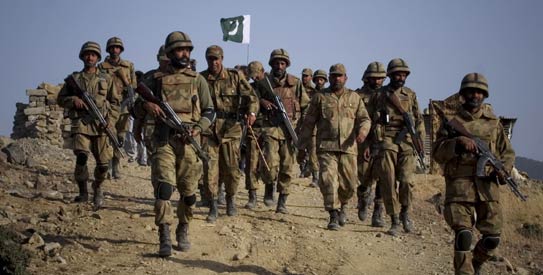The U.S. relationship with Pakistan is important, and military dialogue between the countries continues despite recent serious setbacks, Pentagon Press Secretary George Little said today.
The United States has expressed deep regret over the NATO air strike that killed 24 Pakistani soldiers near Afghanistan’s border with that nation Nov. 25-26, and offered to compensate the families of those killed and wounded in the incident, but ground supply routes through Pakistan remained closed to coalition forces in Afghanistan.
“We conducted a thorough investigation into the border incident, we have acknowledged and take responsibility for the mistakes we made on 25-26 Nov, [and] … we have expressed our deepest regret to the Pakistani people, to the families of those who were lost and those who were wounded,” Little said.
“We are hopeful,” he added, “that our Pakistani partners will reopen the ground supply routes.”
Supplies are adequate to continue the war effort in Afghanistan, Little said, adding that supplies are coming into Afghanistan through air routes and through the northern distribution network, a series of commercially based logistic arrangements connecting Baltic and Caspian ports with Afghanistan via Russia, Central Asia and the Caucasus.
“The relationship with Pakistan is important on many levels. They’re an important partner, and we cooperate with them on counterterrorism and other efforts,” the press secretary said.
“That being said, we know there have been rough patches, particularly over the past year,” he added. “But it remains an essential relationship, and we’re committed to improving that relationship over time.”
On Dec. 26, U.S. Central Command released an unclassified version of an investigation report of the cross-border incident by its investigating officer, Air Force Brig. Gen. Stephen Clark, director of plans, programs, requirements and assessments for Air Force Special Operations Command.
A copy of the report was delivered to the Pakistani government, Little said. Pakistani officials were invited to participate in the investigation, but they declined.
According to the report, on the night of Nov. 25-26, an Afghan army commando company, partnered with U.S. Army Special Forces, landed in the Khas Kunar district of Afghanistan’s Kunar province in an area of operations assigned to the International Security Assistance Force’s Regional Command East.
The ground forces were executing an operation approved by ISAF Joint Command headquarters when they came under fire from positions on a ridge near the Afghanistan-Pakistan border.
In self-defense, the report said, they used air support to engage the ridgeline positions.
The air engagement ended 90 minutes later and had included about 45 minutes of fire. Eventually, it became clear from various information exchanges that those engaged at the ridge were Pakistani military personnel.
In the early hours of Nov. 26, the report said, supporting aircraft pulled back from the border area and Pakistani authorities reinforced their border positions and reportedly removed 24 dead and 13 wounded.
Defense Secretary Leon E. Panetta has not had conversations with his Pakistani counterparts on the border incident report, Little said, although Army Gen. Martin E. Dempsey, chairman of the Joint Chiefs of Staff, and Marine Corps Gen. James N. Mattis, commander of the U.S. Central Command, both made contact with their Pakistani counterparts immediately after the incident.
“And of course, we have [the Office of the Defense Representative] in Islamabad,” the press secretary added, which oversees U.S.-Pakistan military relations, including training and equipment, “and military dialogue continues.”











